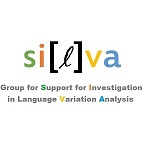
Name
Group of Support for Investigation in Language Variation Analysis
Members
Giménez Moreno, Rosa (coordinator); Prado Alonso, José Carlos (secretary); Fernández Domínguez, Jesús; Ferrer Mora, Hang; Micó Romero, Noelia; Ramírez Polo, Laura; Ricart Vayá, Alicia; Sevilla Pavón, Ana
Objectives
The main objectives of the SILVA Group are:
- To deepen the definition of the fundamental parameters for the study and analysis of linguistic variation and the factors involved in current use in the English language and other majority languages, such as German and Spanish.
- Investigate the different parameters of linguistic variation that fluctuate throughout everyday communication from the family to the professional environment.
- Work from corpus linguistics and from other different fields of study of human communication, contrasting advances and results between languages.
- To design methodologies for the study of linguistic variation, not only effective in the search for and detection of distinctive features that clarify the definition and typology of its parameters of analysis, but also practical for its learning and mastery, especially at a social and professional level.
Lines of research
The three main lines of research that all members of the team share are:
- Linguistic variation
- Contrastive linguistics
- Corpus linguistics
In addition, due to their diverse research backgrounds and areas of interest, the team approaches the study of linguistic variation from the following perspectives:
- Modern Language Acquisition and Language Teaching
- Communicative genre analysis
- Academic and research communication
- Intercultural communication
- Professional communication (business, legal, journalistic, bio-health, etc.)
- Contrastive politeness
- Descriptive studies
- Phonology
- Digital genres
- Lexicography
- Lexicology
- Cognitive linguistics
- Forensic linguistics
- Interpersonal metadiscourse
- Morphology
- Discourse Pragmatics (Pragmalinguistics)
- Rhetoric and stylistics
- Semantics
- English Syntax
- Translation Technologies
- Discourse theories
- Terminology applied to translation
- ICT applied to the study and teaching of linguistic variation
- Translation of humour in audiovisual texts
- Professional translation
